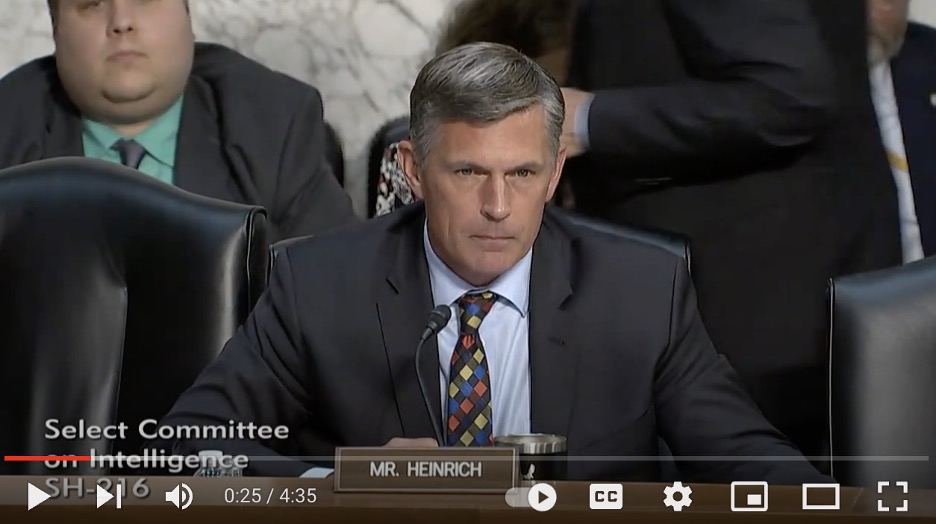Heinrich Presses Top Tech Executives on Identifying and Combatting Threats to the 2024 Election
WASHINGTON – U.S. Senator Martin Heinrich (D-N.M.), a member of the Senate Select Committee on Intelligence, questioned Kent Walker, President and Chief Legal Officer at Alphabet, and Nick Clegg, President of Global Affairs at Meta, on their companies’ work to identify and combat online threats to the 2024 elections. In addition, Heinrich emphasized the responsibility of tech companies to detect and remove content that may pose a threat to the safety of nonpartisan election workers in New Mexico and across the country.
On removing deceptive links or images containing fraudulent information that appears to come from a legitimate news organization:
Heinrich began his questioning, “I want to stay on this same topic on the sort of fraudulent news sites that look like something people would recognize from their own news preferences. Do each of your companies have a policy of removal once you become aware of something that is clearly a fraudulent version of a legitimate site?”
Kent Walker, President and Chief Legal Officer at Alphabet, responded, “In my view, it does not depend on whether the topic had anything to do with politics. Those are counterfeit sites. Those are people using the trademarks of Fox News and the Washington Post without their permission and in a way that deceives the public and diminishes the value of those companies. So yes, and I think you'd see pretty universally across the industry terms of use that prohibit that.”
Heinrich underscored the need to better and more appropriately combat misinformation through deceptive content, “We need to be on our game and responding with those same tools to be able to identifyand appropriately deal with these things on a much faster rate.”
On the safety of nonpartisan election officials in New Mexico:
Heinrich asked both Walker and Nick Clegg, President of Global Affairs at Meta, “At a hearing on the U.S. House Committee on House Administration last week, the New Mexico Secretary of State testified that, ‘Years of false election claims and ideological attempts to discredit our voting systems and processes have led to increased threats and harassment to election workers.’”
“How have you sought to improve your platform's ability to detect and remove content that actually threatens or harasses people who are part of the of the Democratic process and apparatus for fairly administrating elections?” Heinrich asked.
Walker responded, “There are two elements of that. One is making sure that we are trying to safeguard our elections officials against threats that may be posted online. The second half is helping our election officials be more protected themselves through the use of some of the tools that we have spoken about, like the advanced protection program, so their information is not being hacked or doxed.”
Clegg responded, “We encourage local election officials to use our platforms to communicate with voters. So, we established a system called voting alerts ... around 650 million voting alerts have been issued by local and state officials on [our] services so that voters are properly informed about where and when to vote.”
Background:
Heinrich has long supported legislation to uphold and preserve Americans’ civil liberties, while working to safeguard the integrity of our elections from threats at home and abroad, including through detection of deceptive AI-generated election content.
Heinrich is among leading lawmakers in Congress spearheading bipartisan efforts on responsible AI policy. Specifically, he has been vocal on the need to improve and modernizeprotections for our voting systems, registration data, and ballots to prevent theft, manipulation, and malicious computer hacking.
In 2023, he supported the Protecting Election Administration from Interference Act which would update federal election records requirements.
In 2019, he supported the Elections Security Act that would also implement necessary protections from cyberattacks and disinformation campaigns. He condemned then Majority Leader McConnell for blocking this legislation.
In 2018, Heinrich (D-N.M.) joined U.S. Senators James Lankford (R-Okla.), Amy Klobuchar (D-Minn.), Kamala Harris (D-Calif.), Susan Collins (R-Maine), and Lindsey Graham (R-S.C.) in introducing the bipartisan Secure Elections Act, a bill to strengthen election cybersecurity in America. The Senators originally introduced the legislation in 2017, and worked with stakeholders to revise and strengthen the bill.
Heinrich’s Leadership on Election Security and Combatting Threats Specifically Related to Russia:
As a member of the Senate Select Committee on Intelligence, Heinrich played a key role in investigating Russia’s efforts to interfere with the United States’ 2016 election. After the investigation concluded, Heinrich joined the Committee in releasing recommendations on election security and findingsregarding Russian targeting of election infrastructure.
During the investigation, Heinrich questioned Facebook Chief Operating Officer Sheryl Sandberg and Twitter Chief Executive Officer Jack Dorseyin a Senate Select Committee on Intelligence hearing about foreign influence operations and their use of social media platforms.
Heinrich has also repeatedly condemned former President Donald Trump’s uplifting of Kremlin propaganda and disinformation. This includes Heinrich’s speech when he voted to convict Trump in his first impeachment trial in 2020, saying, Trump was “more focused on lobbing insults and spreading Russian conspiracy theories on Twitter than he is on his intelligence briefings.”
Heinrich said in that floor speech:“Right now, patriotic Americans working in the State Department, for our intelligence agencies, and serving in the military are defending us from grave threats. These Americans pledge to obey the orders of their commander-in-chief. They trust that their commander-in-chief's loyalty and sole focus is squarely on the best interests of the United States of America. I don't say this lightly: President Trump has betrayed that trust. He promised to put America first. Instead, he put himself first.”
For more information on Heinrich’s efforts to address Russia’s actions, please see here.
###
